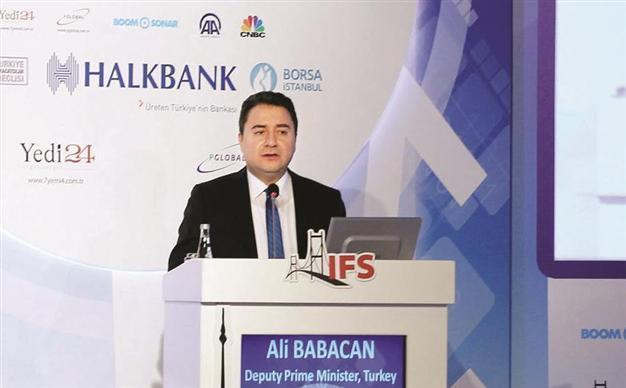Growth quality crucial, not quantity, says Turkish Deputy PM
ISTANBUL - Anadolu Agency

Turkish Deputy Prime Minister Ali Babacan says there are downward risks to the 4 percent growth target and some concerns about growth quality during the fourth Istanbul Finance Summit. AA photo
There are downward risks threatening Turkey’s 4 percent growth rate target and the quality of growth is important, rather than its quantity, said Deputy Prime Minister Ali Babacan during the fourth Istanbul Finance Summit yesterday.“There are downward risks to our 4 percent growth target; while regarding only growth figures it is good but there are some concerns about growth quality,” Babacan said.
He described the three key elements of growth as being financial, social and environmental sustainability. Babacan noted that Turkey preferred a scenario of growth based not on consumption but rather on private and state investments, with investment expenditures coming predominantly from the private sector, rather than the state. He said they desired state expenditures to remain lower compared to that of the private sector. Babacan noted that he considered healthy growth to be based on foreign demand, not domestic demand.
While Turkey’s economy grew 4.4 percent in the second quarter, above expectations, the growth rate in the first half reached 3.7 percent. However, consumption in the public and private sectors compensated the negative impact of the export, which was the main item of the growth last year.
Private sector-led growth important
Babacan stated that a strong market economy and a private sector-led growth principle would be important in the coming period. He also added they would reveal the medium term program before the middle of October.
“Rapid economic growth in Turkey comes from the private sector, which takes its source from foreign loans,” Babacan said. “Our private sector seems to take a part of its loan from abroad, however it is actually their [Turkish private sector’s] own money.” He stressed that Turkey’s assets and equities should not cover only Turkey but also Turks living abroad, and noted that cyclical precautions were needed to decrease additional foreign financing.
Babacan underlined the OECD had indicated that Turkey would grow more than 5 percent economically in the next 10 years, the most rapid rate seen anywhere in the world. Babacan also said there has been a limited capital outflow from Turkey since Bernanke’s comments in May, which was overwhelmingly interpreted as a revaluation of assets. He reminded that it would be an error to be deceived by looking at today’s liquidity plenitude, and warned that Turkey should be highly cautious while implementing its own monetary policies.
Bourse Istanbul set to determine energy prices
Speaking at the same event, the Chairman of Borsa Istanbul (BIST) Ibrahim Turan said that their aim was to make Istanbul a benchmark to determine the prices in the energy market.
Turna stated that Istanbul would be not only a center of financial conventions and assets and securities, but also a center for energy and agreements on energy with a high potential in the region.
“Our target here is to make Istanbul a benchmark to determine the prices in the energy market,” he noted.
Babacan also said they planned to carry out the public offering of BIST by the end of 2015.
















